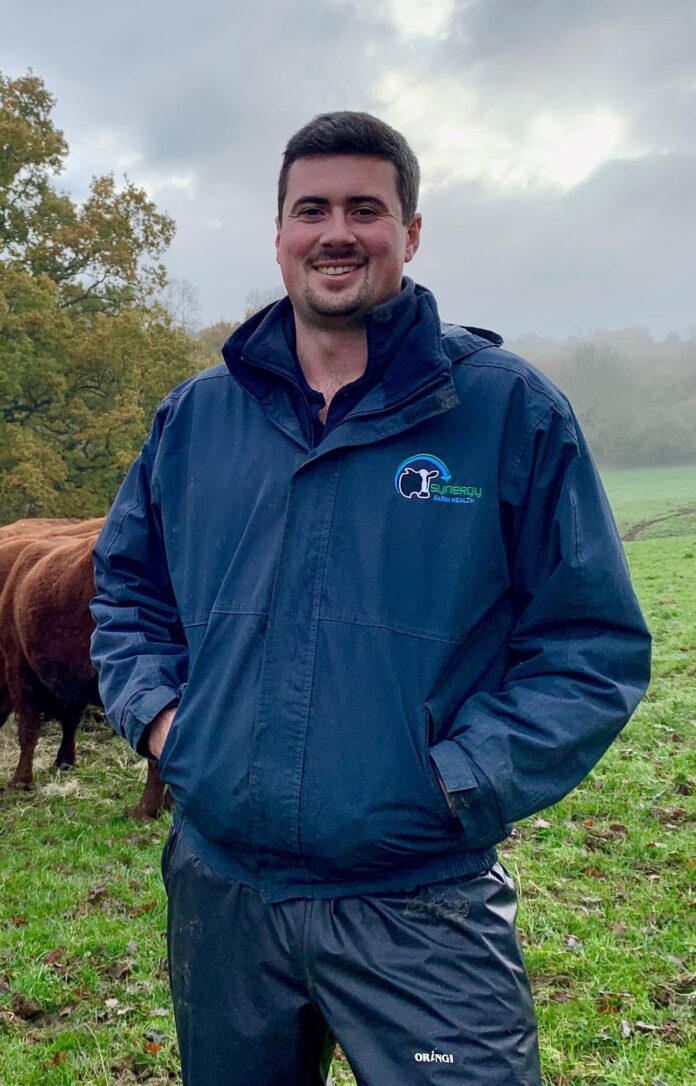Cattle farmers are being encouraged to think differently about lungworm in 2023 and to develop strategies to prevent production losses rather than treat infections.
“Habitually worming cattle during the autumn and at winter housing (aiming to clean out residual gut or lungworm burdens) may give you peace of mind, but it’s time to think more sustainably,” urges vet Tom Warboys from Synergy Farm Health.
He points out that wormer resistance is growing rapidly in the UK, particularly against ivermectins, and unnecessary routine use of these valuable anthelmintics stops cattle developing natural immunity to lungworm and harms vital insect populations.
“Ivermectins are fantastic products, but to preserve them we must use them more judiciously – and only when we absolutely have to,” Mr Warboys says.
“We probably underestimate the negative impact frequent worming with ivermectins has on soil health. For example, dung beetles are highly beneficial for farm productivity but do not tolerate these wormers. Whilst moving 500x their own body weight of organic material, they reduce dung levels and therefore potential lungworm burdens left on pasture, improve soil health and make more grass available for future grazing. It is now time to think differently about habitual worming and focus on making a sustainable parasite control plan for every farm,” he adds.
Synergy Farm Health is recommending cattle farmers work with their vet to adopt a five-point parasite management plan for 2023, with the focus on reducing the need for blanket worming when cattle are housed for the 2023/24 winter
Reduce stock vulnerability. Focus on immunity-based disease prevention. Disease-free cattle (e.g. free from BVD, IBR etc.), fed a high plane of nutrition and vaccinated against lungworm prior to turnout in 2023 are far less likely to need worming at all.
Know your pastures. Assess pastures for risk, based on the stock that was grazing the ground during 2022. This could be done by colour-coding (e.g. red for previous grazing by youngstock, amber for adults and green for no previous grazing such as new lays, aftermath or grazing by other species) – and remember which fields contain lungworm.
Adopt faecal egg counting. Worm egg counts are exceptionally useful indicators for group worming treatments.
Assess cattle before any worming treatment. Liveweight gains, body condition scores, cleanliness of back ends, number of grazing seasons etc., are all there to guide you and are reliable indicators.
Use the right drug for the bug. White or yellow drenches are usually adequate if you need to worm and do less damage to the environment.
However, Mr Warboys stresses that parasite control should not be considered in isolation.
“It should always form part of herd health planning when you can discuss it fully with your vet, or perhaps at a seasonal visit – if using an advisory package similar to Synergy’s beef suckler scheme.”
Help keep news FREE for our readers
Supporting your local community newspaper/online news outlet is crucial now more than ever. If you believe in independent journalism, then consider making a valuable contribution by making a one-time or monthly donation. We operate in rural areas where providing unbiased news can be challenging. Read More About Supporting The West Wales Chronicle
























